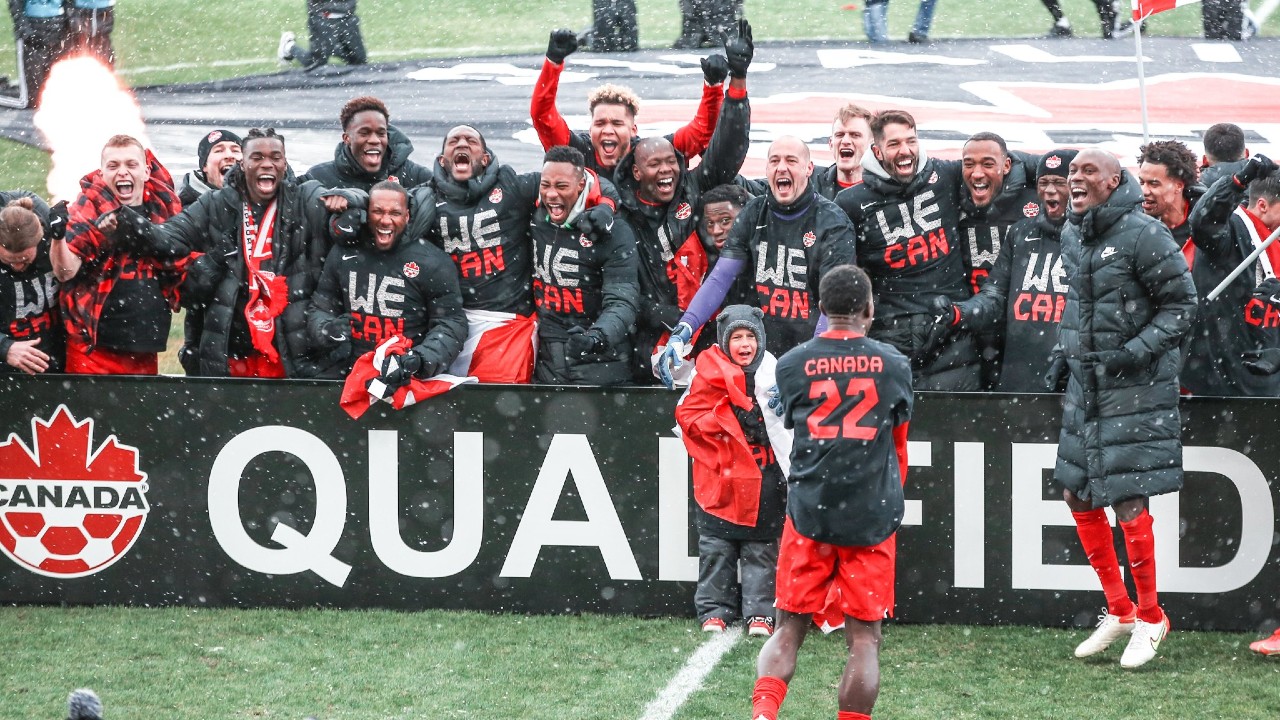
This one’s for you…. if you spent your Saturday mornings tuned in to Graham Leggat; if you ever had to explain that soccer wouldn’t really be better if only they would score more goals; if you suffered through 8-1 in San Pedro Sula; if you shed a quiet tear watching Owen Hargreaves playing in the World Cup for England.
If you’re old enough to remember 1986…
But now, you also have company — and that’s a good thing.
Canada’s qualification for the World Cup in Qatar, sealed with a 4-0 win against Jamaica in Toronto on Sunday, is a sea change moment for sports culture in this country.

It is the Vancouver-Whistler Olympics in 2010, Donovan Bailey crossing the finish line in 1996 (or if you prefer, Ben Johnson crossing in 1988), and a whole host of hockey victories, though the difference there is that triumphing in the shallow pool of countries that share our national game reassured us about our place in the world rather than charting a new path.
Canada will make its second appearance in the most important sporting event on the globe at the same time as interest in the sport is cresting in this country. That convergence this November — focused on a Canadian side that is talented and exciting and full of promise for the present and the future — is going to produce one of those rare moments when it feels like we are all watching the same thing at the same time, when the nation’s hearts beat as one.
There was a time not so long ago when soccer in Canada was essentially a cult sport. Not when it came to participation — it became the dominant summer game for kids more than 40 years ago — but in terms of those who followed it passionately as spectators. Various attempts were made to sell the game the rest of the world loved to skeptical North Americans, but those always ran up against what appeared to be natural limits to growth.
The truth is the hardcore soccer community was part of the problem. A lot of them weren’t all that interested in expanding the tent. Like fans of the most obscure music or fine art, they enjoyed their outsider status, wrapped in Old World conceits. If you (or your ancestors) hadn’t grown up in the shadow of the San Siro or Old Trafford, no one was really interested in giving you the secret password.

At World Cup time, those were the folks driving around with the flags of everywhere-but-here on their cars. Meanwhile, the Canadian Men’s National Team, backed by its hardy band of loyal supporters, the Voyageurs, offered occasional moments of encouragement (the win over Mexico on the way to the 2000 Gold Cup) sprinkled in amid many more moments of disappointment, frustration and heartbreak.
Then, really not-that-quietly, soccer started happening.
The English Premier League and the UEFA Champions League became part of the mainstream sports conversation. Television ratings for the World Cup and the European Championships soared. MLS teams in Toronto, Montreal and Vancouver were immediate successes. The Canadian Premier League made a strong debut.
And perhaps most importantly, the Canadian Women’s National Team carried the country’s soccer hopes and dreams, beginning with the U19 tournament in 2002, and finally reaching the top step of the podium at the Tokyo Olympics last summer.
So the stage was set. But what seemed far less likely even a year ago was that this would be the defining moment for the Men’s National Team. Yes, there were hints in a glorious victory over the Americans at BMO Field in 2019 and in a strong Gold Cup performance last summer. But the thinking was that it would be 2026, when Canada would get an automatic berth as the World Cup co-host, when the sport would have its breakthrough.

This magical qualifying run, with its stars, its signature moments, with the same inspirational coach who transformed the women’s team, has played out like a fairy tale. Except that it’s not a fluke, it’s not a one-off, and no one is turning into a pumpkin at midnight.
They did it in style. They gave no quarter. They made no concessions. Facing Mexico at the Azteca? No problem. Venturing to hostile stadiums in Central America? Bring it on. The Americans? Dispatched at Tim Horton’s Field.
In 1986, this country didn’t fully appreciate what it meant to qualify for the World Cup (a 24-team World Cup), to watch a Canadian team on the same pitch as the likes of Michel Platini. Instead, that historic achievement became an easy punchline — they didn’t even score a goal!
In November, it will be very different. Soccer in Canada will be just about everybody’s game. A whole lot of those car flags will bear red maple leaves, and we will joyously wrap ourselves in our colours as we have in the most memorable sports events of our lives.
From there, there is no turning back.






